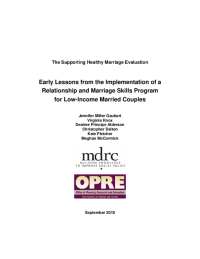Early Implementation Lessons from the Supporting Healthy Marriage Evaluation
This report presents early implementation and operational lessons from the Supporting Healthy Marriage (SHM) evaluation. Funded by the Administration for Children and Families, SHM uses a rigorous research design to test the effectiveness of a new approach to improving outcomes for low-income children: strengthening the marriages and relationships of their parents as a foundation for family well-being. It also uses implementation research to document and assess how the organizations that were selected to be in the study are implementing the SHM model. The SHM model is for low-income married couples and includes three components: relationship and marriage education workshops that teach strategies for managing conflict and effective communication, supplemental activities that build on workshop themes and skills through educational and social events, and family support services that pair couples with specialized staff who facilitate participation and connect couples with needed services. In the first year of program implementation, SHM providers focused on three main tasks: developing effective marketing and recruitment strategies, keeping couples engaged in the program, and building management structures and systems. Lessons in these three areas from implementation analyses are the focus of this report. Highlights include:
- Marketing and recruitment. Simply distributing brochures and posters has not been a sufficient recruitment technique for most SHM programs. Programs have found that they also need to partner with local agencies and community organizations, and go into their communities to speak directly with couples.
- Engaging couples. Anticipating that participating in long-term services would be a challenge for many families, SHM programs have made services as accessible and as attractive as possible. They offer activities during evenings and weekends, provide meals, transportation and child care assistance, emergency funds, and modest incentives. Workshop spaces have been designed to provide comfortable seating for the multi-hour sessions and often look more like living rooms than classrooms. In addition, SHM programs hired male and female staff who are culturally attuned to the populations in their communities, important for engaging both men and women and for engaging couples from diverse cultures.
- Managing for performance. The SHM research team has held programs accountable by requiring that they achieve particular benchmarks in enrollment and participation in order to remain in the study. Local managers use a management information system to track daily staff efforts, hold one-on-one supervision meetings, and observe staff interacting with couples to directly assess program quality.
Early participation data show encouraging trends. Within six months of enrollment, more than 80 percent of couples attend at least one workshop and go on to complete an average of 20 workshop hours. More than 85 percent of couples attend at least one family support meeting and complete, on average, 4.5 meetings within six months. Over the next several years, the SHM evaluation will continue to examine how these relationship and marriage education programs develop lessons about operating in varied settings with diverse populations over time and, ultimately, will provide information on whether these services make a difference in a range of outcomes for low-income married couples and their children.






